
It’s a sunny Sunday morning in Vincent, Alabama, and the town’s many church parking lots are packed — but the doors to the police department are locked, and there hasn’t been a single Vincent officer working here since August.
That’s when the city council voted to disband the entire department — one of the oldest in the state of Alabama — after a racist text message sent by a Vincent officer became public. Residents were up in arms at an emergency council meeting held at the local high school, and Vincent made international headlines for all the wrong reasons. The text, written by a white officer, had been about a pregnant slave, smack in the middle of land that for years had been tended by Black men, women and children robbed of their freedom.
Many of their descendants still live in the region, about a 40-minute drive from Birmingham, where a church bombing that killed four young Black girls will mark its 60th anniversary this September. Montgomery, which played such a pivotal role in the civil rights movement, is about 80 miles south. The police department incident made Vincent look like a veritable stereotype of the Deep South, backward and divided, in a state attempting to distance itself from historical racial discord.
“I had a gentleman come to a council meeting and straight up ask me: ‘What are you gonna do to repair our image?’” embattled Vincent Mayor James D. Latimer tells The Independent after the first city council meeting in April.
The issue of local policing comes up at most council meetings now, as well as in casual conversations throughout Vincent. There have been 911 calls that have allegedly gone unanswered, prompting residents to go to nearby towns for help. The county has taken over Vincent law enforcement, but locals grumble and offer anecdotes about other nearby town and city departments stepping in to respond quickly to incidents such as accidents, with sheriff vehicles turning up far later.
The policing question has yet to be answered.
But, a few months after Vincent disbanded its three-person force, a Black-run coffee operation came to town — and with it came Naimah Elmore.
A fledgling entrepreneur, the 39-year-old arrived just before Christmas with a petite frame and infectious personality; person upon person in Vincent now points to Alicia’s Coffee — inspired by Ms Elmore’s middle name, and the only Black-run coffee shop of its kind in Shelby County, according to her — as the centre of community life and buzz.
“Being here, I feel like the unity that they already had, they just needed somebody to bring it out of them,” Ms Elmore, who grew up in a similar small town about 40 miles northwest of Vincent, tells The Independent on a recent Tuesday. A woman of faith — the daughter of a teacher and a preacher — Ms Elmore doesn’t work Sundays, reserving them instead for “refuelling.”
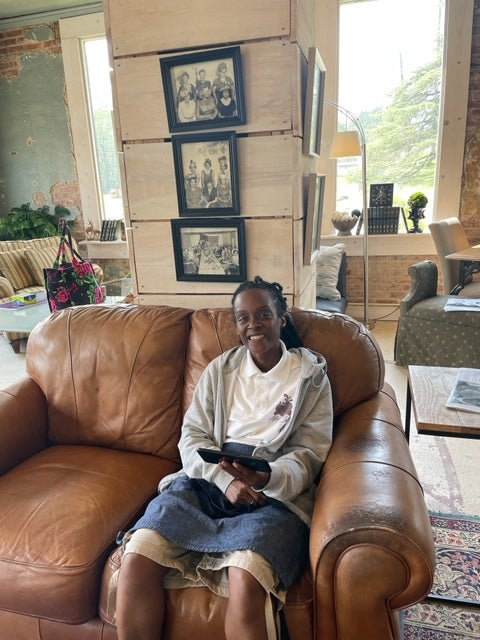
Support for the coffee shop from locals, regardless of race, was swift and strong, Ms Elmore says.
“I’ve had customers come in, and literally, like you wouldn’t believe ... they brought me oxtails, pork chops, vegetables, tissue, hand soap,” Ms Elmore says. “I’ve had customers come in here, man, bring us milk. The cup you’re drinking from? A customer and her husband, they bought those for us — a thousand ... because they say they want us to stay here.”
The Vincent City Council officially welcomed Ms Elmore at a recent meeting; she’d originally been coaxed to Vincent as a pop-up operation in partnership with businesswoman Terri Smith, who runs furniture shop Foundlings Emporium, a few doors down from the shuttered police department.
The pop-up success led to a brick and mortar business across the street, where the Alicia’s Coffee furnishings, from Ms Smith’s emporium, are also all for sale.
“Seldom a day goes by that [Ms Elmore] does not get ... ‘We love having you here. We can’t believe what a wonderful asset this coffee shop is,’” Ms Smith tells The Independent, adding how a local sign maker was also donating his talents.
“He’s designing her sign to put in the window because they so badly want this community to have more of an identity than this recent stupidity,” says Ms Smith.
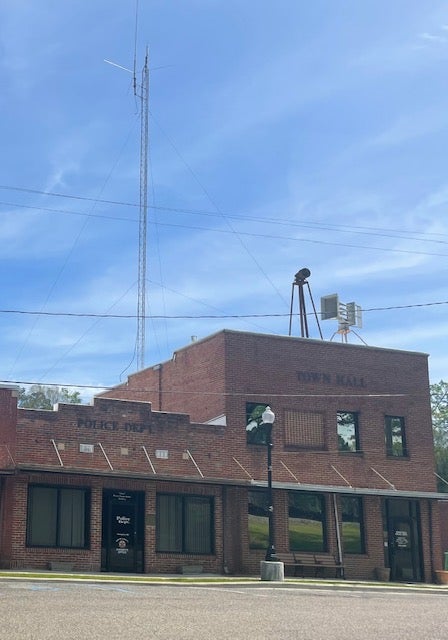
While the coffee shop may be fostering Vincent dialogue, Ms Elmore says that — as she talks to and hears a cross-section of the population — she also believes the bad publicity helped bring them closer.
“I think that what happened in August just shook up the community a little bit, and it tried to divide them — but I think it made them stronger, actually,” Ms Elmore says.
Warren Davis, a 43-year-old Vincent native who is also Black, agrees.
“I will say that it brought some things to light, but what it also did, it helped us grow and come together as a community, because you actually saw both Black and white come together and say, ‘Hey, you know what? We’re gonna stand for what’s right,’” he says.
The racist text message was originally sent in June, city officials said, and became public in July, prompting the suspension of both the Vincent police chief and assistant chief. In August, an official ordinance to dissolve the department passed unanimously in the Vincent City Council, paving the way for the two suspended officers to be laid off. Within hours of the ordinance passing, the third and final officer resigned.
Mr Davis, who spent years working in Birmingham law enforcement, said the swift condemnation proved: “It’s not the past anymore ... that last little bit of past that was still lingering, because of what happened, it got eradicated.
“At the time, it was 2022; now it’s 2023 — so, you know, everybody’s like, how long are we going to keep living in the 30s, 40s and 50s? It’s 50, 60, 70 years later. It’s time to put the fire out.”
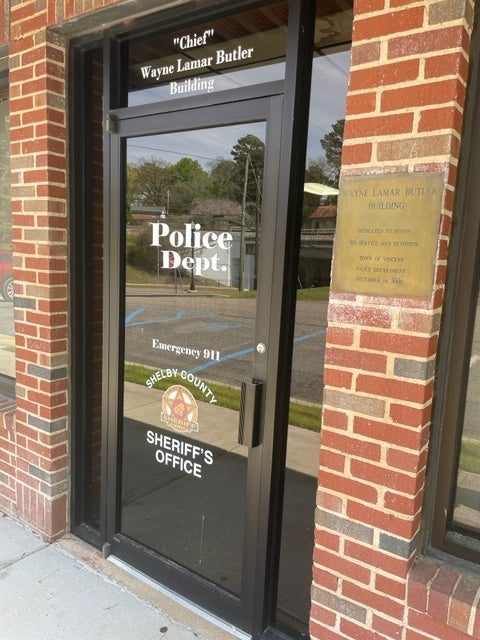
The coffee shop is just one factor indicative of a town — or at least ambitious portions of it — trying to leave the past behind. The suburban sprawl from Birmingham is edging ever closer; just 12 miles from Vincent’s downtown, closer to the larger city, half-million-dollar homes continue to go up in luxury developments. Minutes to the northeast of Vincent, waterfront homes are getting snapped up by buyers from Atlanta, Birmingham and other larger, wealthier Southern strongholds.
Vincent has a library, a credit union, a Dollar General, a hair salon, a post office, a food store, two furniture shops, a motorcycle repair shop, a gas station and a plethora of churches. For a time, there was excitement about a quarry that has yet to materialize; in 2009, the local cotton gin was named to the Alabama Register of Landmarks and Heritage, sparking dreams of a tourist destination.
When it comes to Vincent’s growth, “in all honesty, it’s going to happen,” says Mr Davis, pointing out that the town “is a corridor” between Highway 280 and Interstate 20.
“We are of course trying to get the storefronts filled; we are really trying to make Vincent more than just a small town,” he says. “We’re trying to make Vincent a place that people want to stop. That’s one of the key things — actually creating something that, when people pass through, they’ll be like, ‘Hey, you know, let’s check that out’ — like the coffee shop.”
Vincent also includes a middle school and high school, the latter of which made it to the playoffs last year in football, winning 10 games in a season for the first time ever Players’ family members and others who’d donned the Yellow Jackets uniform in bygone years were invited down onto the field, locals say, representing a social crossection of Vincent. The town, in the 2020 census, was around three quarters white and under 20 per cent Black; both races were represented on the football field. But even those official numbers may be misleading when it comes to the town’s population, according to Vincent’s mayor.
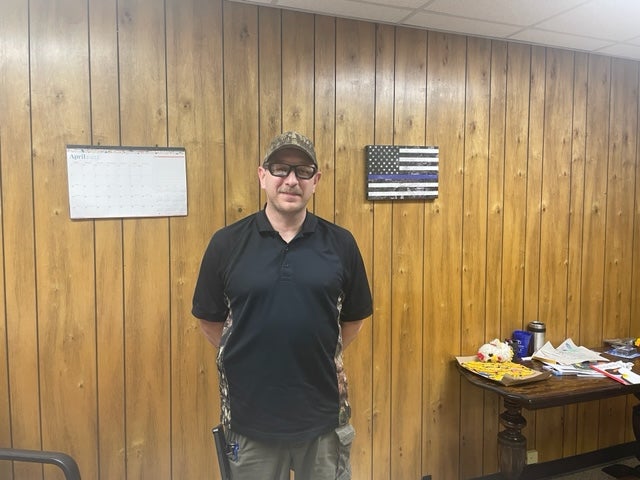
The census placed locals at numbering just under 2,000, but “I really do think there was a lack of participation that made our numbers go down, and that affects the money that we get from the state, from the federal government, says Mayor Latimer, estimating the Vincent population at closer to 2,500 to 2,700.
“I can sympathize with people that are concerned about, you know, talking to the government ... but what they don’t understand is, when they don’t participate in that census, that affects grant money, that affects road-building and things like that,” he says. “And it has a far-reaching effect on the city and holds us back when people don’t participate in that kind of thing.”
There is undoubtedly government distrust amongst factions within Vincent, where “no trespassing” signs are not uncommon on properties and at least one Confederate flag flies proudly. Almost everyone around here is armed. But there’s also a unifying irritation at the disappearance of the town cops — and frustrations with the city council.
Mr Latimer, 43, is the son of a former Vincent cop — and a police officer himself in the nearby city of Moody, which adds an interesting dimension to the decision to disband Vincent’s entire department. After the first council meeting of April, he sits at his cluttered desk, sporting a camouflage hat and a mustache, and declines to divulge exactly why the council thought it best to dissolve Vincent PD altogether, rather than just take action concerning the offending officer.
“There were other factors,” Mr Latimer tells The Independent, though he admits that, in August, “the majority of people, they wanted our police, our own police department.
“They had issues with what happened and the personnel that were involved, of course, but they were not happy to disband the police department. I think that is starting to change a little bit.”

The city eventually worked out a contract with the Shelby County Sheriff’s Department, which now provides school resource officers and cover for Vincent. Only recently did “Shelby County” signage appear on the shuttered door of the former Vincent Police Department, adjacent to Town Hall.
“It is a little bit more expensive to go with Shelby County, but the benefits are all the training opportunities,” he says. “We don’t have any maintenance costs as far as managing a fleet of vehicles or anything like that. It is a little bit simpler for us, and we get a good caliber of officer.”
Many locals, however, remain unhappy — concerned not just with the damage to the town’s reputation but also with less nuanced and comprehensive law enforcement practices.
Gas station owner Karim Ajani has lived in Vincent for nearly 20 years, relocating to the area because his wife has relatives nearby. Originally from India, Mr Ajani worked for IBM in Colorado and New York before opening his business in Vincent, where the people have always been “awesome, they’re great, they’re very friendly,” he says.
Until August, Mr Ajani says, the Vincent police added an extra layer of protection for the gas station, particularly at closing time — but the Shelby County contract does not offer the same level of visibility, he says.
“That does haunt me, at times — late at night, I don’t know what’s going on in the streets, so I do check the cameras” more often than he did before August, he says.
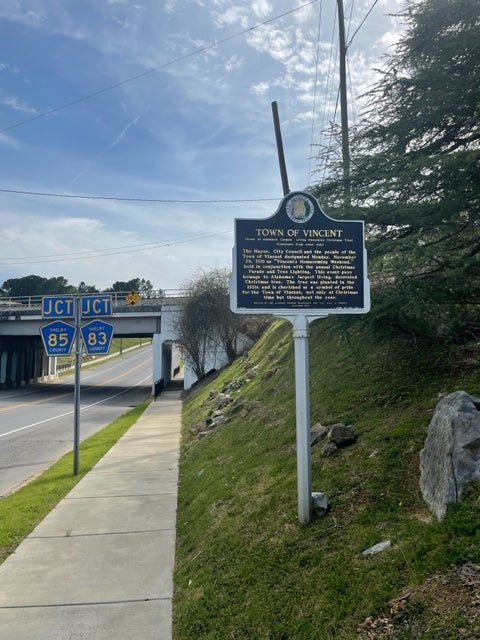
The disbanding of the Vincent department “was a blow, I feel, to what the town has been wanting to go into in terms of growing, attracting more businesses,” Mr Ajani says. “Losing the police department, I think, was a negative, because it doesn’t give you the comfort feel that, is this really the town where I want to be as a business owner?”
Ms Smith, who runs Foundlings Emporium, says she hears about the want for a police department from “every single person who comes in my store, and without exception.”
There have been complaints at city council meetings about a lack of law enforcement coverage; in October, a representative from the neighboring Harpersville Police Department attended a meeting to report that 911 calls from Vincent to the county had apparently gone unanswered over the weekend, prompting people to come to Harpersville for help.
In a town featuring many multi-generational families, a healthy distrust of authority and not a great deal of wealth, many fear that a lack of local, tuned-in cops will also lead to a lack of peaceful resolutions and more arrests. Ms Smith points out that a Vincent force would be aware of residents’ criminal, personal, family and often health histories.
“The local cops know that, and they’ll go over and say, ‘Come on now, back to your house,’ and nobody gets arrested ... just local policing,” she tells The Independent. “If you had to call an external law enforcement agency, that means they don’t know anybody, they’re going to put everybody in jail, these very poor people are going to have to come up with bail and an attorney to get out of this situation — and it exacerbates a situation that’s already bad to begin with.”

Vincent native Warren Davis looks at the policing needs with a practical eye; he spent years working in Birmingham law enforcement himself.
“If you brought a [new] police force here, I mean, the first thing you would need is, you have tohave a solid leader; you will have tohave someone that’s going to be able to come in and actually rebuild a police department, and you also have to have dedicated officers,” he says. “And, you know, to be honest with you, with what Vincent would be able to pay as far as salary-wise, what kind of police officer would you get?”
Mayor Latimer — whose term lasts until 2025 and who says, without really saying it, that he didn’t sign up for this debacle — points to similar challenges.
“Therein lies another problem, when you have gone through something like this — that makes it much harder to recruit people, because there’s the stigma,” he says. “It’s unfortunate, and hopefully, at some point, we’ll get past that, and we can bring our police department back, because this is one of the oldest police departments in the state ... it’s been around for over 100 years, and that’s unfortunate, to lose that piece of history.”
When it comes to re-establishing Vincent’s own force, though, he says: “I don’t know what the timeframe is for making that decision. It really depends a lot on what the people want.”
The majority of people seem to want their police back, a well as their good name. In a strangely fortuitous way, the exposure of Vincent’s underbelly has further united the town, residents say, and strengthened the commitment to progress — all of this often gelling at Alicia’s Coffee.
“Us being here, making it, people actually talk it out instead of yelling it out,” Ms Elmore says. “So I think it needed to happen to open up a lot of eyes in the community and understand what your community’s done. And for you to be a small town, but end up on CNN, you’re not a small town. You’ve got to figure it out, you know, and that’s what I feel like they’re trying to do, and it’s not going to happen overnight.
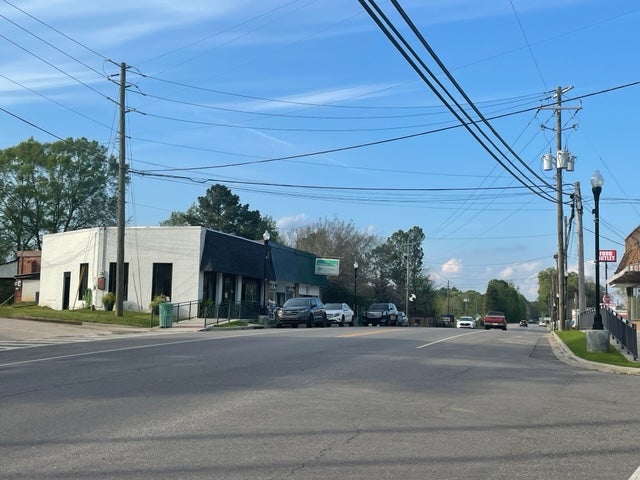
“It’s not going to happen in one year, it’s not going to happen in two years, it’s going to take time for everybody to come together and make this right. But we’ve got to understand: What we’re trying to make right is for the next generation, those kids in elementary, some of the kids coming out of high school, you want to be a good example for them — so they want to come back.”
There is not a lot of opportunity for younger generations in Vincent; self-employed residents work in trades while other locals travel to factories or service jobs in nearby towns. Most people can namecheck the handful of residents who left, pursued higher education and careers, then returned to build a life in — and contribute to — their hometown.
When school lets out every day, Ms Elmore stands outside her coffee shop, waving to the students as the buses pass by.
“They don’t want to tell people [when] they go out of town, ‘Hey, I’m from VIncent,’ and then all they know is what happened with the police department,” Ms Elmore says. “That brings on stress on kids ... but I think, if they start working more together, it’ll go better.”
She’s happy to provide a space facilitating that cooperation amongst Vincent residents.
“They needed a spark,” Ms Elmore tells The Independent. “God put us here for a reason.”







